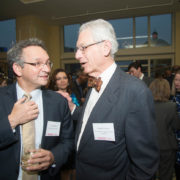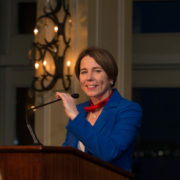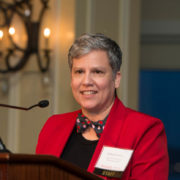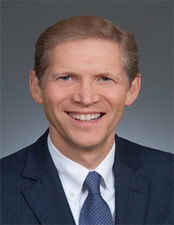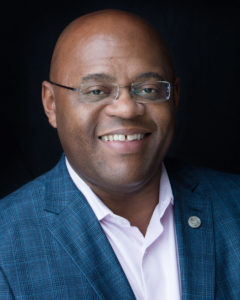
2018 Good Apple recipient Senator William “Mo” Cowan
For Immediate Release
Honoring Senator William “Mo” Cowan, Vice President of Litigation and Legal Policy of GE
Boston, MA – On March 29, 2018, the Massachusetts Appleseed Center for Law and Justice (“MA Appleseed”) honored former Senator William “Mo” Cowan with its 11th annual Good Apple Award. The event began with a reception, which began at 6:00 pm, in the Wharf Room at the Boston Harbor Hotel. Every year, MA Appleseed presents a “Good Apple” award to someone in the Massachusetts legal community who demonstrates the principles of social justice and equal opportunity that MA Appleseed was itself founded on. The event, which serves as Massachusetts Appleseed’s annual fundraiser, raises money to support the organization’s program and outreach efforts.
“We are thrilled and proud to present Senator Cowan with this year’s Good Apple Award,” said Martha Mazzone, chair of the Board of Directors of MA Appleseed. “Mo’s commitment to inclusion, justice and civic engagement – don’t turn your back on the system, work to improve it – mirrors the Appleseed mission perfectly. Add in his dedication to the Boston legal community, his huge circle of friends and family and colleagues and mentees, and he’s the perfect Good Apple recipient. Everyone wants a chance to say thank you to Mo.”
Featured speaker at the event, Attorney General Maura Healey remarked, “I am grateful to be able to recognize Massachusetts Appleseed for their critical work in developing and advocating for systemic solutions to social justice issues while celebrating this year’s Good Apple, my dear friend Mo Cowan. Mo is a champion for social justice whose life and legacy represents the best our community has to offer.”
Senator Cowan is a graduate of Duke University and Northeastern University School of Law. In 2013, he represented Massachusetts as interim U.S. Senator, filling the vacancy left by John F. Kerry when he was appointed Secretary of State. Senator Cowan served as Chief Legal Counsel, Chief of Staff, and Senior Advisor to the Governor in the administration of former Governor Deval L. Patrick and, in the Fall of 2013, Senator Cowan was a Fellow at the Harvard University Institute of Politics. In 2017 Sen. Cowan assumed the position of VP of Global Litigation and Legal Policy at GE, after having served Of Counsel to Mintz Levin and as President and CEO of ML Strategies.
“I am humbled to receive this great honor from the Appleseed Center,” Senator Cowan said. “I deeply appreciate the recognition and cherish the opportunity to be associated forever with an organization committed every day to social justice and the rule of law, and to follow in the footsteps of the distinguished past honorees. Thank you for helping me make my family proud!”
Senator Cowan is on the Board of Directors for Eastern Bank Corporation, Partners Healthcare, and is Co-Chair of the Greater Boston YMCA Board of Overseers. He further serves our community as a Trustee of Northeastern University, the Massachusetts General Hospital, and is a member of the Boston Club Corporate Advisory Board, Duke University Trinity Board of Visitors, Cambridge College President’s Council, and U.S. Association of Former Members of Congress.
Senator Cowan is an active civic leader committed to the same principles of inclusion and justice that is at the foundation of all of MA Appleseed’s work. When appointing Cowan to serve as interim U.S. Senator, former MA governor Deval Patrick described him as having “brought preparation, perspective, wisdom, sound judgment, and clarity of purpose” every step of the way, with the needs of Massachusetts’ residents always on the forefront of his mind.
“Mo’s evenhanded approach to difficult issues and his persistence in pursuing a better, fairer world is an inspiration to many. We are proud to present him with this year’s Good Apple Award,” said Deborah Silva, Executive Director of MA Appleseed.
2018 Good Apple Award Recipient (PDF)
2018 Good Apple Invitation (PDF)
Recent past recipients of the Good Apple award include Jonathan Chiel, Executive Vice President and General Counsel for Fidelity Investment; Paul Dacier, former General Counsel of EMC Corporation (now Dell); Susan Alexander, Chief Legal Officer of Biogen Idec; Lon F. Povich, Former Executive Vice President and General Counsel of BJ’s Wholesale Club, Inc.; Stephanie S. Lovell, Senior Vice President and General Counsel of Blue Cross Blue Shield of Massachusetts; and Jeffrey N. Carp, Executive Vice President and Chief Legal Officer of State Street Corporation.
About the Massachusetts Appleseed Center for Law and Justice:
Massachusetts Appleseed’s mission is to promote social justice and equal rights for Massachusetts’ residents by developing and advocating for systemic solutions to issues of systemic inequality.
At Massachusetts Appleseed, we dedicate ourselves to remedying social injustices for at-risk and underserved children, youth, and adults residing within our state. Working with volunteer lawyers, community partners, and others, we identify and address gaps in services and opportunities in areas such as education, homelessness, and the accessibility of the Massachusetts court system. Through in-depth research, consensus building, and community problem solving, we develop powerful solutions for reforming the systems and structures responsible for injustice. Our work seeks to level the playing field and transform communities. Every year we honor someone in the legal professional equally committed to these principles through our “Good Apple” award.





